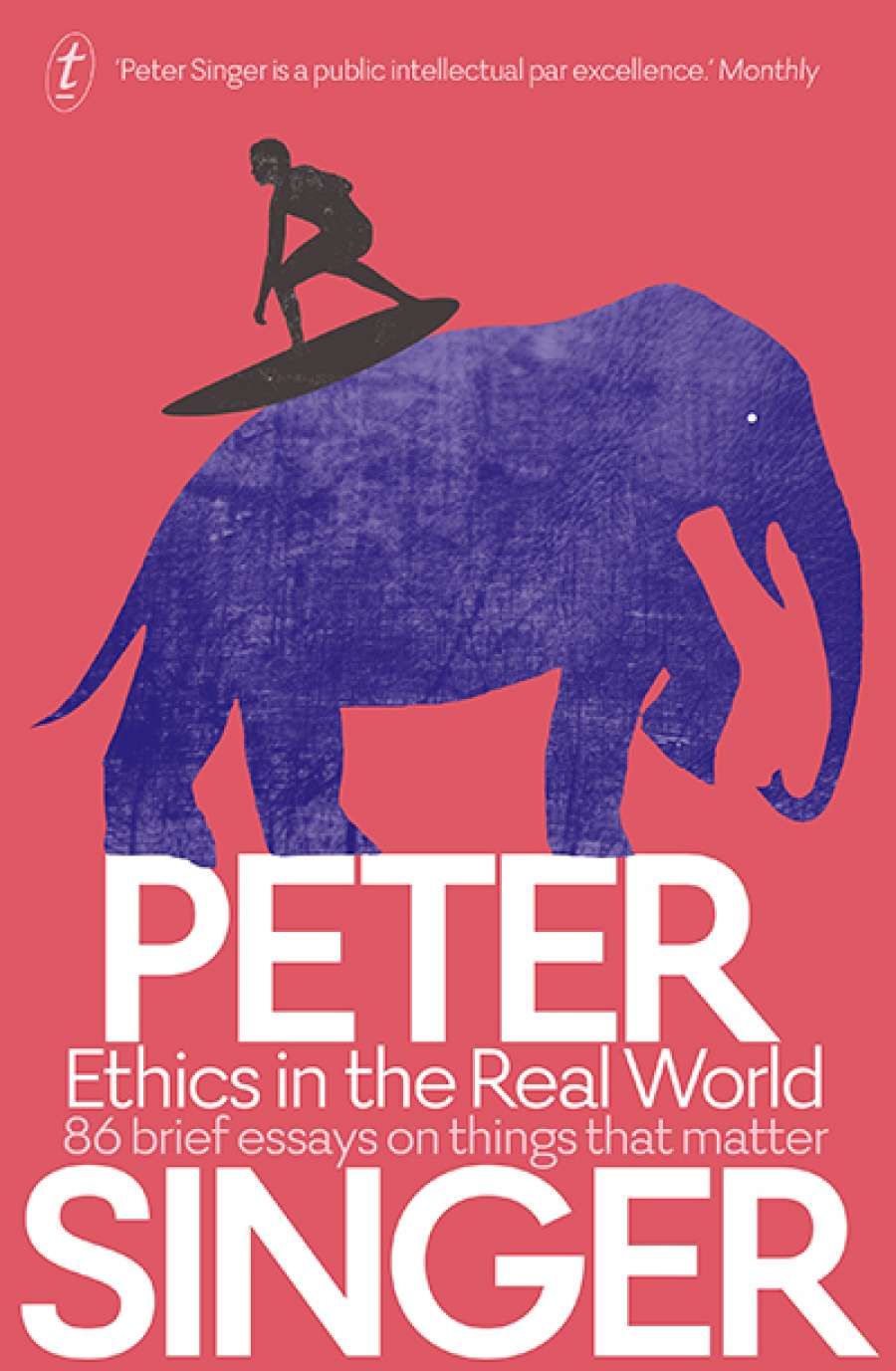
- Free Article: No
- Contents Category: Philosophy
- Custom Article Title: Ben Brooker reviews 'Ethics in the Real World: 86 brief essays on things that matter' by Peter Singer
- Custom Highlight Text:
In its original meaning, the word ‘philosopher’ simply meant ‘lover of wisdom’. At a time when theories of knowledge were still in their infancy, it was applied to thinkers – often, by ...
- Book 1 Title: Ethics in the Real World
- Book 1 Subtitle: 86 brief essays on things that matter
- Book 1 Biblio: Text Publishing, $32.99 pb, 336pp, 9781925355857
In a career spanning five decades and the publication of twenty-three books, many of them bestsellers, Singer has remained committed to the ideal of, in his words, ‘address[ing] issues that matter to people outside departments of philosophy’.
The effect of the eighty-six short essays in Ethics in the Real World – some previously published as newspaper articles, though most reproduced from Singer’s monthly column for the Project Syndicate news service, which he has been writing since 2005 – is to consolidate familiar lines of argument rather than to break new ground or signal any major shifts in Singer’s thinking. Divided into eleven themed chapters, Singer has trod much of this philosophical terrain before: animal suffering and rights, euthanasia and abortion, and, continuing the theme of his last two singly-authored books, The Life You Can Save (2009) and The Most Good You Can Do (2015), the movement known as effective altruism, which aims to mitigate world poverty through evidence-based charitable donations.
The topics that feel novel, such as artificial intelligence (‘Rights for Robots?’ co-authored with Agata Sagan) and ethics in sport (‘Is Doping Wrong?’, ‘Is It OK to Cheat at Football?’) are vividly illuminated by Singer’s trenchancy and clarity of expression. We have come to expect a certain amount of moral contrarianism from Singer, but these two last essays demonstrate that he is equally adept at reasserting a commonly held view (that cheating at football is morally indefensible) as exposing the unexpectedly weak cases for others (that performance-enhancing drugs should not be allowed in cycling or other professional sports). As Singer makes clear at the book’s outset, many of these essays, written for the widest possible audience, do not flow from utilitarian positions.
 Peter Singer (Text Publishing)Those who choose to emphasise Singer’s more controversial assessments will find fresh grist in Ethics in the Real World. In the chapter titled ‘Beyond the Ethic of the Sanctity of Life’, Singer’s challenging views on the permissibility of killing newborn babies, first advanced to international outcry in the widely translated Practical Ethics (1979), are restated with few concessions to his critics. Singer’s views on infanticide have always made for uncomfortable reading, and they do so again here in three essays that address the issue of abortion in the developing world, and whether the lives of premature babies and those with ‘hopeless’ prognoses should be prolonged at all costs. ‘We have no obligation,’ Singer writes in ‘The Real Abortion Tragedy’, ‘to allow every being with the potential to become a rational being to realise that potential’.
Peter Singer (Text Publishing)Those who choose to emphasise Singer’s more controversial assessments will find fresh grist in Ethics in the Real World. In the chapter titled ‘Beyond the Ethic of the Sanctity of Life’, Singer’s challenging views on the permissibility of killing newborn babies, first advanced to international outcry in the widely translated Practical Ethics (1979), are restated with few concessions to his critics. Singer’s views on infanticide have always made for uncomfortable reading, and they do so again here in three essays that address the issue of abortion in the developing world, and whether the lives of premature babies and those with ‘hopeless’ prognoses should be prolonged at all costs. ‘We have no obligation,’ Singer writes in ‘The Real Abortion Tragedy’, ‘to allow every being with the potential to become a rational being to realise that potential’.
Such provocations are offset by musings on the Melbourne City of Port Phillips’ attempts to make social well-being a policy focus, and on Singer’s taking up surfing in his fifties (‘too old ever to become good at it, but young enough for surfing to give me a decade of fun and a sense of accomplishment’). In the final essay, originally published in the Sydney Morning Herald in 2011, Singer looks back on his mushroom-clouded childhood and the awakening of his political consciousness by the folly of the Vietnam War. As for the moral progress we have made in the intervening years, Singer gives a mixed assessment. He writes: ‘So we are passing on to the next generation a world in which the risk of nuclear annihilation has receded, sexism, racism and even speciesism are on the retreat, important areas of wilderness are protected, more children than ever go to school, and extreme poverty and infant mortality are falling.’ But the threat of dangerous anthropogenic climate change looms larger than ever. Our failure to decarbonise the economy in response to an impending crisis we have been aware of since at least 1992, Singer laments, will give future generations reason to curse us.
‘There is a view in some philosophical circles,’ Singer notes in the book’s introduction, ‘that anything that can be understood by people who have not studied philosophy is not profound enough to be worth saying. To the contrary, I suspect that whatever cannot be said clearly is probably not being thought clearly either.’ Lucidly conceived and written, the brief essays in Ethics in the Real World attest to Singer’s enduring facility for wise, clear-headed enquiry into some of the most pressing issues we face. It is not a manifesto for utilitarianism, but a convincing case for philosophy’s continued engagement with ethical questions that matter in the real world.


Comments powered by CComment